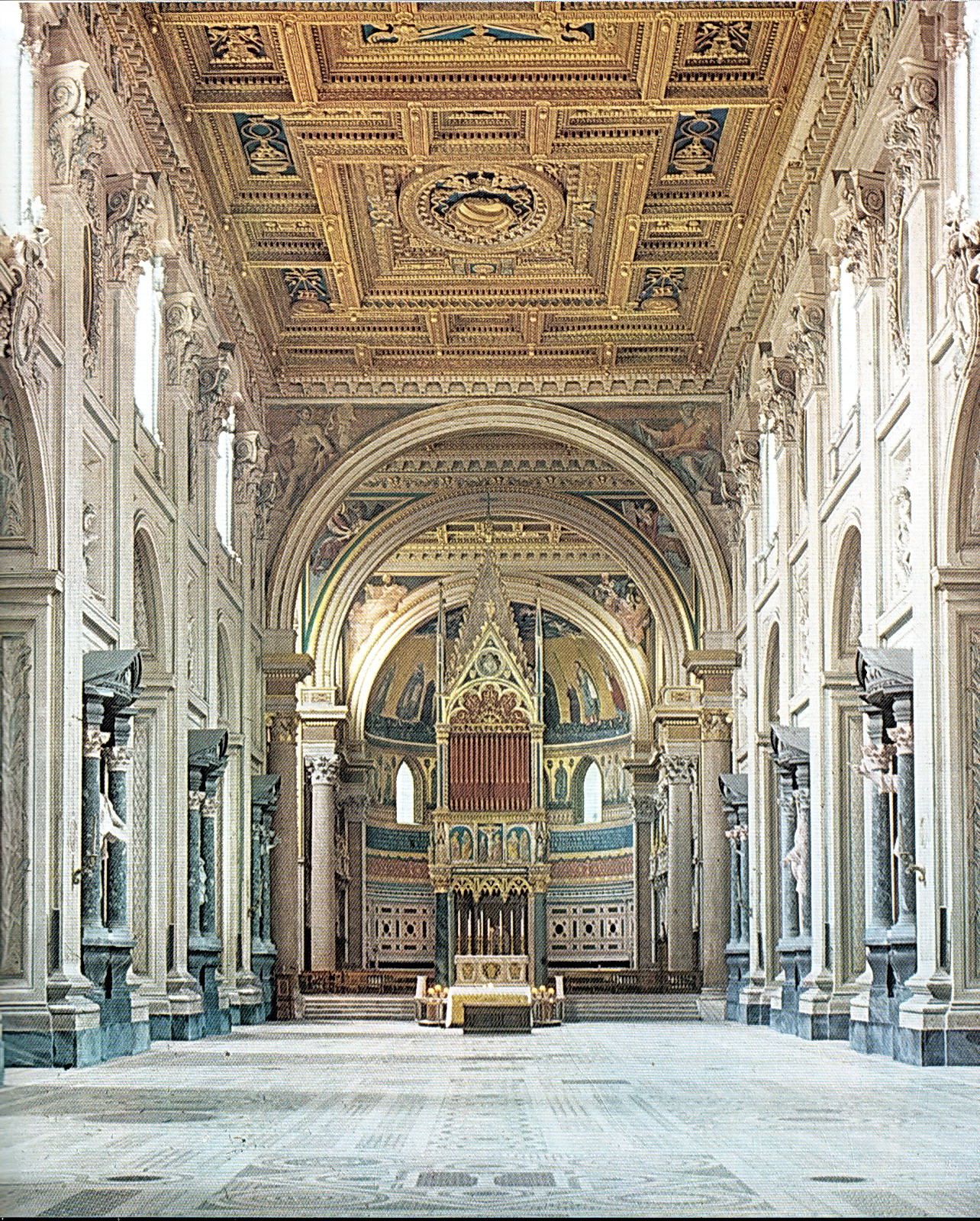 |
| Interior of St John Lateran in Rome, Italy |
The angel brought me
back to the entrance of the temple,
and I saw water flowing out
from beneath the threshold of the temple toward the east,
for the façade of the temple was toward the east;
the water flowed down from the southern side of the temple,
south of the altar.
back to the entrance of the temple,
and I saw water flowing out
from beneath the threshold of the temple toward the east,
for the façade of the temple was toward the east;
the water flowed down from the southern side of the temple,
south of the altar.
We Conventual Franciscan friars serve at a parish/shrine in Carey, Ohio – the minor basilica of Our Lady of Consolation. On one side of the church is an enormous vat of holy water with a half-dozen taps. Pilgrims brings buckets and bottles to draw water to bless their homes, families and loved ones. Some of them drink it but I wouldn’t recommend that. In any case, I remember that fountain whenever I hear today’s reading about water flowing from the temple of Jerusalem.
Saint John tells us there actually was such a spring by the temple; this is the Pool of Bethesda where Jesus cured the man who had been waiting 38 years for a cure. John’s stories of the woman at the well and the spear thrust into Jesus’ heart also recall this apparition in the writings of Ezekiel; and finally John 7:37-38:
On the last day of the festival, the great day, while Jesus was standing there, he cried out, ‘Let anyone who is thirsty come to me, let the one who believes in me drink. As the scripture has said, “Out of his heart shall flow rivers of living water.”
As we celebrate the Dedication of the Pope’s basilica, St. John Lateran, we recall these images of sacred water flowing from the temple. They are the waters of birth and baptism, of bathing, blessing, drinking and healing.
Saint Clare of Assisi also had a most striking vision about Saint Francis which relates somehow to this mystical tradition:
Lady Clare related how, once in a vision, she brought a bowl of hot water to Saint Francis along with a towel for drying his hands. She was climbing a very high stairway, but was going very quickly, almost as if she were going on level ground. When she reached Saint Francis, the saint bared his breast and said to the Lady Clare, “Come, take and drink.” After she had sucked from it the Saint admonished her to imbibe once again. After she did so what she had tasted was so sweet and delightful she in no way could describe it. After she imbibed, that nipple or opening from the breast from which the milk comes remained between the lips of Blessed Clare. After she took what remained in her mouth in her hands, it seemed to her it was gold so clear and bright that everything was seen in it as in a mirror.
Clare apparently took this dream as an affirmation of her faith in her friend and mentor, Saint Francis. His most faithful and ardent disciple, she drank deeply of his teachings on poverty, which he regarded as the fastest, surest and simplest approach to spiritual perfection. Both saints ran that steep ascent as if they were tumbling down hill, so eager were they to walk in the footsteps of Jesus. They were astonished at the simplicity of poverty and the immediate communion it gave them with the earth and its creatures, the poor, sick and the lame, and with Jesus.
Catholics today enjoy a privilege Saints Francis and Clare never knew, we drink from the Chalice the Sacred Blood of Jesus Christ. Drawn to our Holy Father and his cathedral (St. John Lateran) with its massive stones and enormous statues we find ourselves swept into the saving flood that flows from the temple of his heart. We are washed in the blood of the lamb, suckled by the milk of his comfort, intoxicated by the wine of his Holy Spirit – if only we might appreciate such a gift.
No comments:
Post a Comment
I love to write. This blog helps me to meditate on the Word of God, and I hope to make some contribution to our contemplations of God's Mighty Works.
Ordinarily, I write these reflections two or three weeks in advance of their publication. I do not intend to comment on current events.
I understand many people prefer gender-neutral references to "God." I don't disagree with them but find that language impersonal, unappealing and tasteless. When I refer to "God" I think of the One whom Jesus called "Abba" and "Father", and I would not attempt to improve on Jesus' language.
You're welcome to add a thought or raise a question.